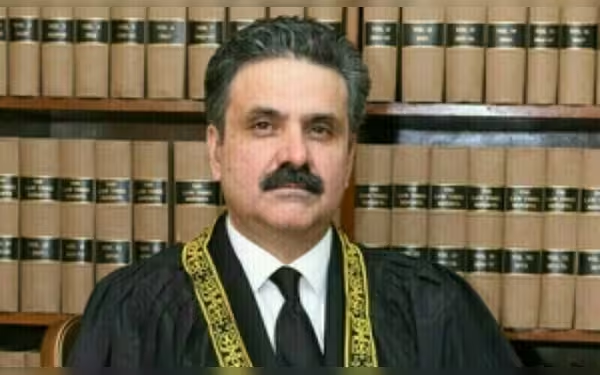Saturday, November 16, 2024 07:54 PM
CJP Addresses ATC Case Backlog in Pakistan
- CJP highlights 2,273 pending cases in Anti-Terrorism Courts.
- Urgent reforms needed to expedite justice in terrorism cases.
- Collaboration proposed to enhance forensic support in Balochistan.
 Image Credits: brecorder
Image Credits: brecorderCJP addresses the backlog of 2,273 cases in Anti-Terrorism Courts, emphasizing urgent reforms for timely justice.
In recent times, the issue of delayed justice in Pakistan has come to the forefront, particularly concerning the Anti-Terrorism Courts (ATCs). These courts play a crucial role in handling cases related to terrorism, which are sensitive and require prompt attention. However, a significant backlog of cases has raised alarms among legal authorities, prompting urgent discussions on how to address this pressing issue.
On Thursday, Chief Justice of Pakistan, Justice Yahya Afridi, convened a meeting with administrative judges of ATCs at the Supreme Court in Islamabad. The meeting aimed to tackle the alarming backlog of 2,273 pending cases across the country, with a staggering 1,372 cases awaiting resolution in Sindh alone. This situation not only hampers the judicial process but also undermines public confidence in the legal system.
During the meeting, attended by various judges and prosecutors from all provinces, the Chief Justice emphasized the necessity of expediting the resolution of these cases. He pointed out that delays in justice can have dire consequences, especially in cases involving terrorism, where timely decisions are essential for maintaining law and order.
Several key challenges were identified that contribute to the backlog in ATCs. These include the need for enhanced security measures for witnesses, the facilitation of online appearances to make the process more accessible, and the establishment of Forensic Scientific Laboratories (FSL) to support evidence-based decisions. The Chief Justice also highlighted the importance of creating additional ATCs to manage the high volume of cases effectively.
In a bid to improve the situation, Justice Afridi issued specific directives. He instructed that the FSL in Sindh should extend its support to Balochistan in operationalizing FSL labs in Quetta. This collaboration is expected to bolster the evidence-gathering process, which is vital for the successful prosecution of terrorism-related cases.
Moreover, the Chief Justice proposed that ATC judges who complete their terms should be accommodated in softer positions within the judicial system. This move aims to retain experienced judges while also ensuring that they are not left without roles after their tenure in ATCs. Additionally, he announced that judges who demonstrate outstanding performance should be given opportunities for foreign training, with the support of the Law and Justice Commission of Pakistan.
The discussions held during this meeting reflect a growing recognition of the need for reform within the judicial system, particularly in handling cases of such critical importance. As the Chief Justice and his team work towards implementing these changes, it is hoped that the backlog of cases will be reduced, and justice will be served more swiftly. The public's trust in the legal system hinges on the ability of these courts to function efficiently and effectively, ensuring that those accused of terrorism are dealt with promptly and fairly.
The concerns raised by the Chief Justice regarding the backlog in ATCs highlight a significant challenge within Pakistan's judicial framework. By addressing these issues head-on and implementing the necessary reforms, there is potential for a more responsive and effective legal system that can better serve the needs of the public and uphold the rule of law.













